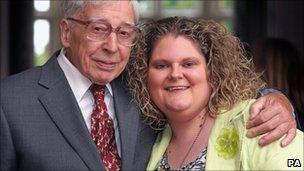Vatican official criticises Nobel win for IVF pioneer
- Published

The first test tube baby celebrated her 30th birthday with Prof Edwards in 2008
A Vatican official has said the awarding of the Nobel Prize for Medicine to British IVF pioneer Robert Edwards is "completely out of order".
Ignacio Carrasco de Paula, head of the Pontifical Academy for Life, said the award ignored the ethical questions raised by the fertility treatment.
He said IVF had led to the destruction of large numbers of human embryos.
Nearly four million babies have been born using IVF fertility treatment since 1978.
Monsignor Carrasco, the Vatican's spokesman on bio-ethics, said in-vitro fertilisation (IVF) had been "a new and important chapter in the field of human reproduction".
But he said the Nobel prize committee's choice of Prof Edwards had been "completely out of order" as without his treatment, there would be no market for human eggs "and there would not be a large number of freezers filled with embryos in the world", he told Italy's Ansa news agency.
"In the best of cases they are transferred into a uterus but most probably they will end up abandoned or dead, which is a problem for which the new Nobel prize winner is responsible."
In his statement, Monsignor Carrasco stressed that he was speaking in a personal capacity.
The Nobel medicine prize committee in Sweden said Prof Edwards' work had brought "joy to infertile people all over the world".
"His achievements have made it possible to treat infertility, a medical condition afflicting a large proportion of humanity, including more than 10% of all couples worldwide," it said.
Prof Edwards efforts in the 1950s, 60s and 70s led to the birth of the world's first "test tube baby", Louise Brown, in July 1978.
Ms Brown said the award was "fantastic news".
"Me and mum are so glad that one of the pioneers of IVF has been given the recognition he deserves," she said.
"We hold Bob in great affection and are delighted to send our personal congratulations to him and his family at this time."
- Published4 October 2010
- Published4 October 2010